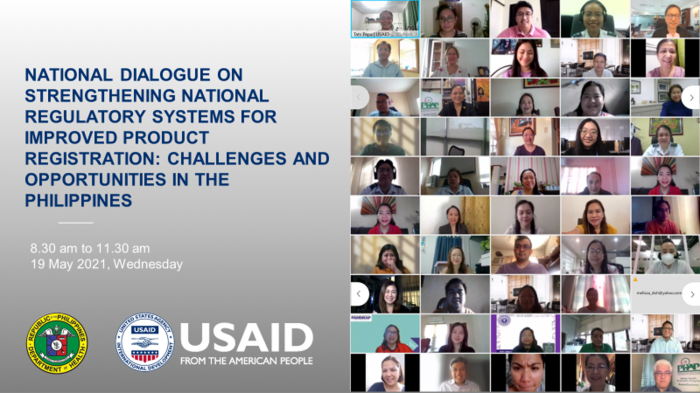A National Dialogue to Improve Medicine Registration in the Philippines
Ensuring the availability of essential medicines and other medical products that address the health needs of a population is essential for an efficient and effective health care delivery system. In the Philippines, its Universal Health Care (UHC) Law guarantees all Filipinos have equitable access to quality, affordable health care services. However, registration of new medicines and medical devices usually takes two to three years. The long and complex process, coupled with it being a manual process, makes product registration with the Food and Drug Administration (FDA) detrimental to the efficacy of the health care industry and public health programs.
On May 19, 2021, Philippines’ FDA, in collaboration with USAID’s Medicines, Technologies, and Pharmaceutical Services (MTaPS) Program, held a national dialogue, gathering key stakeholders from the public and private sectors to determine the actions needed to facilitate a faster registration process for medicines and medical devices. The virtual event, titled “Strengthening National Regulatory Systems for Improved Product Registration: Challenges and Opportunities in the Philippines,” convened around 100 participants representing diverse stakeholder groups, including the Pharmaceutical and Healthcare Association of the Philippines, World Bank, Healthcare Technology Association of the Philippines, and patient groups.
“Regulation is an enabler of quality health care services. The events surrounding the COVID-19 pandemic revealed that the current landscape of regulation for medicines and technology is limited by our existing policies and laws. An innovative and flexible approach is necessary that is (also) responsive to the impacts of this public health emergency,” said Dr. Rolando Enrique Domingo, FDA Director General.
USAID MTaPS supports the FDA as part of its support to the Philippines’ Department of Health to improve pharmaceutical services and strengthen the national medicines regulatory system for greater access to essential medical products, like new tuberculosis and HIV medicines and family planning commodities.
“USAID strongly supports the Department of Health in the implementation of the UHC Law and this important dialogue helps understand the FDA’s and key stakeholders’ roles in improving the national regulatory system for improved and more efficient product registration. USAID is very committed to help strengthen the Philippines’ health system through USAID’s Medicines, Technologies and Pharmaceutical Services (MTaPS) program,” shared Michelle Lang-Alli, Director of USAID Philippines Office of Health.
FDA’s Dr. Domingo emphasized the importance of collaboration across all stakeholders to bring different perspectives into the strategies of improving the regulatory landscape and to deliver interventions that are responsive to the health care needs of the people.
Participants at the event identified challenges and opportunities and discussed next steps that will ensure greater access to safe and quality-assured medical products.
“We, at the Food and Drug Administration, would welcome another opportunity to discuss the next steps and a way forward. Let us all work hand in hand to ensure the Filipino people will have equitable access to affordable health care goods and services,” stated Jesusa Joyce Cirunay, Director of the Center for Drug Regulation and Research at FDA.
A well-structured registration process is a crucial component in the availability of essential and novel health care products and services needed to achieve UHC. The efforts will also increase patients’ confidence in the regulatory and health systems of the country, thereby contributing to better health outcomes.
